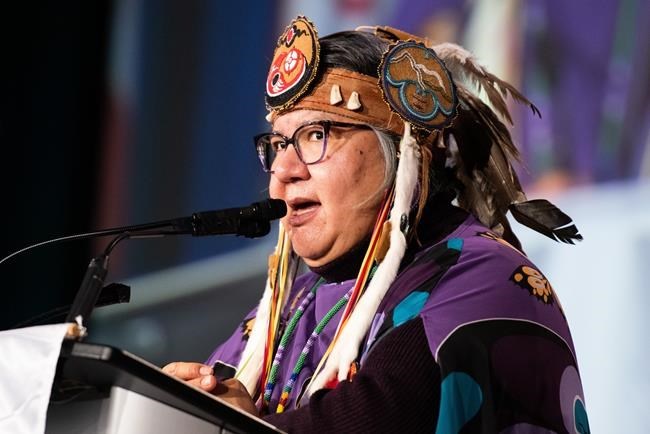The national chief of the Assembly of First Nations says the Pope's willingness to return artifacts stored at the Vatican Museum is another step forward on Indigenous Peoples' journey with the head of the Roman Catholic Church.
"We asked for the return of our sacred items, and they will make their way home soon," said Chief RoseAnne Archibald in an emailed statement.
Pope Francis said Sunday that talks were underway to return the artifacts. He was asked about the issue during a news conference on a flight back home from Hungary and said that "in the case where you can return things, where it's necessary to make a gesture, better to do it."
Much of the Vatican’s current collection is from a former pope who decided to hold a world exposition in 1925. A message went out at that time to missionaries around the globe to send items. More than 100,000 objects and works of art were displayed.
The Vatican has said parts of its collection were gifts to popes and the church.
Francis said Sunday that the "restitution of the Indigenous things is underway with Canada — at least we agreed to do it."
Returning artifacts is vital, said Audrey Dreaver, an artist, curator and instructor at the First Nations University of Canada in Regina. The artifacts give communities connection to history, build pride and help healing, she added.
But Dreaver, who is nehiyiwak or Plains Cree, said there are a lot of questions about the Vatican's process of repatriation.
"Who are they going to give it to? What is their plan to return things," Dreaver asked. "Who exactly are they talking to?"
Taking the items amounted to intellectual and psychological colonization, she said, and their return should not perpetuate that harm.
There must be discussions with Indigenous experts and communities about how to repatriate the exhibits with the respect and care needed, Dreaver said.
"If they haven't reached out to Indigenous people who work in the museum field, how transparent are they being?"
Indigenous delegates who travelled to Rome to meet with Francis last year toured the Anima Mundi museum and requested the return of the items, which included ceremonial masks, wampum belts, embroidered gloves and headdresses. One item they saw was a rare kayak that the Inuvialuit Regional Corp. had requested be returned.
Many objects were taken away from Indigenous people after the Canadian government outlawed cultural practices through the Indian Act in 1876. Ceremonial items and other important objects were seized, then sold, given to museums or destroyed.
Indigenous curators and experts have said they have been unable to get access to the unknown number of objects in the Vatican’s possession.
The pontiff travelled to Canada in July for a six-day tour, during which he apologized for the church's role in residential schools. He also said what happened in residential schools amounted to genocide.
Archibald said returning the artifacts will mark another advancement.
She also pointed to the Vatican's recent denunciation of the Doctrine of Discovery, which was used to legitimize the seizure of Indigenous land.
All the actions came after pressure and petition from Indigenous people, she noted.
"There are many other injustices that the Catholic Church must make right," she said.
"We will not rest until our survivors and little ones who never made it home can have peace."
This report by The Canadian Press was first published May 1, 2023.
— With files from The Associated Press
Kelly Geraldine Malone, The Canadian Press

